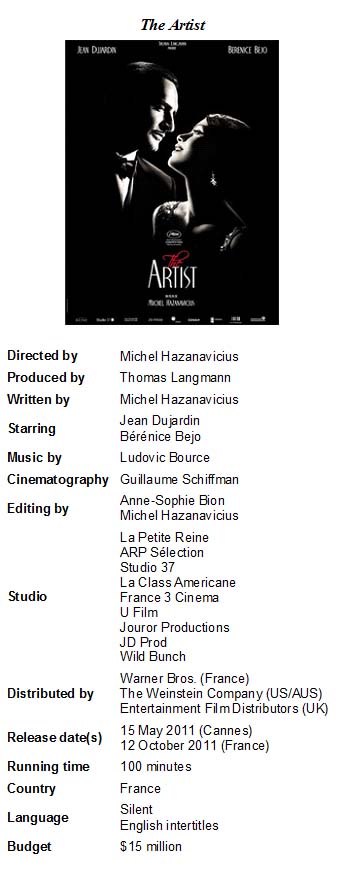The Film
The Artist is a 2011 French romantic comedy drama in the style of a black-and-white silent film. It was written and directed by Michel Hazanavicius and stars Jean Dujardin and Bérénice Bejo.
The story takes place in Hollywood, between 1927 and 1932, and focuses on the relationship of an older silent film star and a rising young actress, as silent cinema falls out of fashion and is replaced by the 'talkies'.
The Artist received near-universal acclaim from critics and won many accolades. Dujardin won the Best Actor Award at the 2011 Cannes Film Festival, where the film premiered. The film was nominated for six Golden Globes, the most of any 2011 film, and won three: Best Motion Picture – Musical or Comedy, Best Original Score, and Best Actor – Motion Picture Musical or Comedy for Dujardin.
In January 2012, the film was nominated for twelve BAFTAs, also the most of any film from 2011. It won seven, the most wins of the night, including Best Film, Best Director and Best Original Screenplay for Hazanavicius, and Best Actor for Dujardin.
The Artist was nominated for ten Academy Awards and won five, including Best Picture, Best Director for Hazanavicius, and Best Actor for Dujardin, who was the first French actor ever to win. It was the first French film ever to win Best Picture, the first mainly silent film to win since 1927's Wings (the first recipient of the Best Picture Award, in 1929), the first film presented in the 4:3 aspect ratio to win since 1955's Marty, the first black-and-white film to win since 1993's Schindler's List, and the first non-R-rated film to win since 2004's Million Dollar Baby.
In France, it was nominated for ten César Awards, winning six, including Best Film, Best Director for Hazanavicius and Best Actress for Bejo. The Artist became the most awarded French film in history.
Cinema Trailer
|
|
Production Director Michel Hazanavicius had been considering making a silent film for many years, both because many filmmakers he admires emerged in the silent era, and because of the image-driven nature of the form. According to Hazanavicius, his wish to make a silent film was at first not taken seriously, but after the financial success of his spy-film pastiches OSS 117: Cairo, Nest of Spies and OSS 117: Lost in Rio, producers started to express interest. The forming of the film's narrative started with Hazanavicius' desire to work again with actors Jean Dujardin and Bérénice Bejo, Hazanivicius's wife, who had starred in OSS 117: Cairo, Nest of Spies. Hazanavicius chose the form of the melodrama, mostly because he thought many of the films from the silent era which have aged best are melodramas. He undertook extensive research about 1920s Hollywood, and studied silent films to find the right techniques to make the story comprehensible without having to use too many intertitles. The screenplay took four months to write. The Artist was filmed in thirty-five days, made in the 1.33:1 screen ratio commonly used in the silent film era. Though presented in black-and-white, it was shot in color by cinematographer Guillaume Schiffman. All the technical details, including lenses, lighting and camera moves, were calibrated to get the look just right. To recreate the slightly speeded-up look of 1920s silent films, the film was shot at a slightly lower frame rate of 22 fps as opposed to the standard 24 fps. Most of the film is silent, except for two scenes of sound; one being a nightmare sequence and the other being the final scene in the film, where two characters speak, and the non-diegetic soundtrack. Throughout the shoot, Hazanavicius played music from classic Hollywood films while the actors performed. The film was produced by La Petite Reine and ARP Sélection for 13.47 million euro, including co-production support from Studio 37 and France 3 Cinéma, and pre-sales investment from Canal+ and CinéCinéma. The cast and the crew included both French and American members. American costume designer Mark Bridges created the wardrobe for the film's cast. |
Music The film's music was composed by Ludovic Bource and produced in Belgium. It was recorded by Brussels Philharmonic and conducted by Ernst Van Tiel. Recording took place during six days in April 2011 at Flagey's Studio 4 in Brussels. The film's climactic scene is set to Bernard Herrmann's 'Scene D'Amour' from his score to Alfred Hitchcock's film Vertigo, in which it similarly accompanies an extended scene without dialogue. Only one song (sung, with lyrics) is used in the soundtrack, 'Pennies from Heaven', sung by Rose 'Chi-Chi' Murphy (uncredited). This song was written in 1936, although the film is set between 1927 and 1932. The soundtrack was released on 21 October 2011 through Sony Classical Records. |
|
Cast Jean Dujardin as George Valentin Bérénice Bejo as Peppy Miller Uggie as Jack (the dog) John Goodman as Al Zimmer James Cromwell as Clifton Missi Pyle as Constance Penelope Ann Miller as Doris Valentin Malcolm McDowell as The Butler Bitsie Tulloch as Norma Beth Grant as Peppy's maid Ed Lauter as Peppy's first chauffeur Jen Lilley as Onlooker Nina Siemaszko as Admiring woman Jewel Shepard as Flapper starlet Basil Hoffman as Auctioneer Ben Kurland as Casting assistant Ken Davitian as Pawnbroker Matt Skollar as Peppy's assistant |
